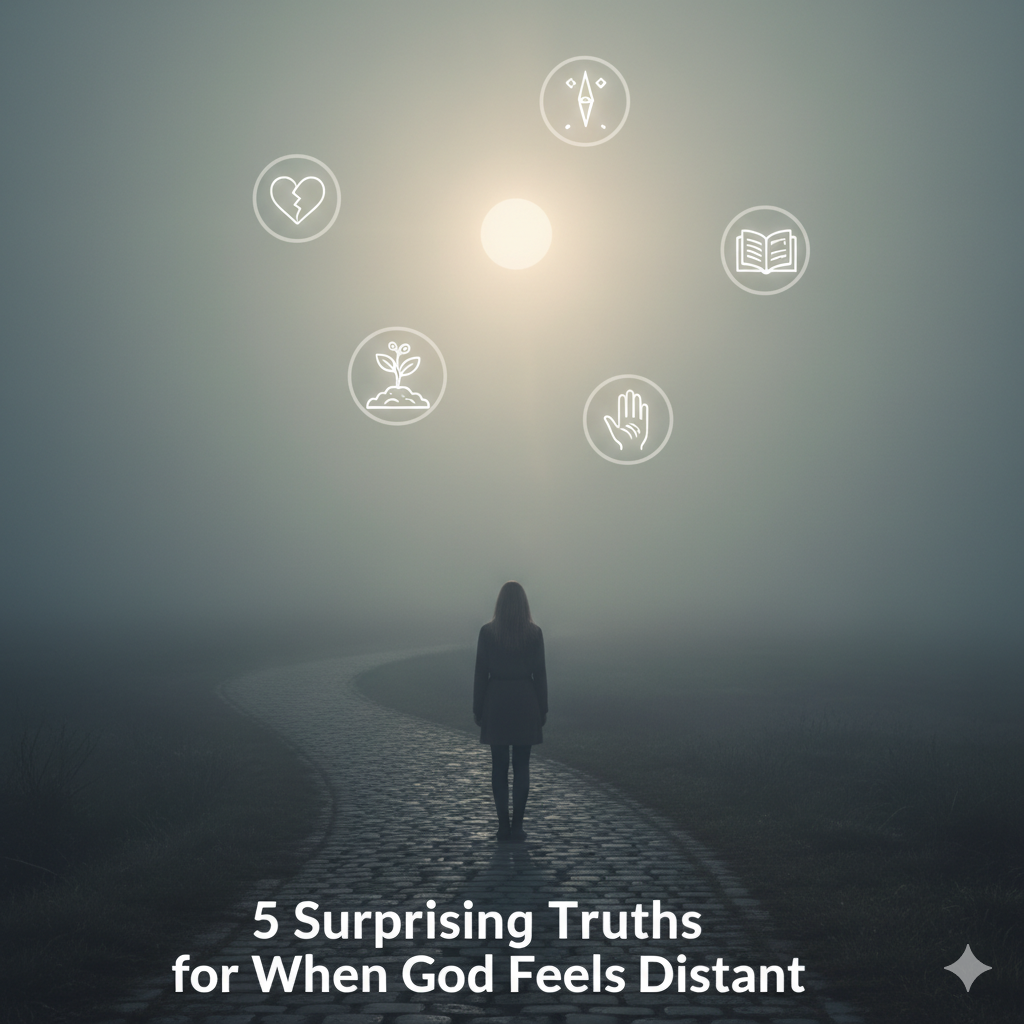Listen to this post: 5 Surprising Truths for When God Feels Distant
There are few experiences more frustrating or lonely than feeling that God is silent. It’s a season where your prayers feel like they are “bouncing off the walls” and your most earnest cries for connection are met with what feels like an empty void. This journey through a spiritual desert, sometimes called a “dark night of the soul,” is a deeply personal and often painful experience. This is not a sign of immature faith; rather, it is often a path that God uses to forge a deeper, more resilient trust in those He loves.
While it can feel isolating, this season of divine silence is a near-universal part of the spiritual journey. If you’re there now, you are not alone. This article offers five surprising and counter-intuitive insights from Scripture, personal stories, and even academic research that can reframe these difficult seasons, challenge common assumptions, and offer a new sense of hope.
——————————————————————————–
1. “Waiting on the Lord” Is an Active, Hopeful Expectation—Not Passive Inaction.
The phrase “waiting on the Lord” often conjures images of passive, helpless inaction—sitting by idly until something finally happens. But the biblical concept is far more dynamic. The Hebrew word for “wait” used in Isaiah 40:31 is Qavah, which means “to wait, look for, hope, expect.”
This simple linguistic insight transforms the entire idea of waiting. It’s not an empty pause but an active posture of faith. This is not wasted time but an “active season of faith and trust” where God is working behind the scenes to prepare and strengthen us for the fulfillment of His promises. This transforms waiting from a passive state of helplessness into an active season of seeking God’s presence, serving others, and meditating on His promises—knowing that He is preparing us even when He is silent.
“But those who hope in the Lord will renew their strength. They will soar on wings like eagles; they will run and not grow weary, they will walk and not be faint.” (Isaiah 40:31)
This understanding reframes waiting from a frustrating delay into a purposeful period of building hopeful expectation and deep reliance on God’s perfect timing.
2. Your Faith Is Built on God’s Word, Not Your Feelings.
Spiritual dryness is accompanied by a host of painful emotions. You might feel rejected, abandoned, or simply that God is absent. These feelings are real and valid, but our faith cannot be built upon them. It must be founded on an objective, unchanging truth: God’s Word. When our spiritual sight is clouded by doubt, we must learn to trust what God has said over what we feel.
In his article “My Dark Night of the Soul,” Jon Bloom offers a compelling analogy. He compares this experience to a pilot flying through a dark cloud. In the disorientation of the storm, the pilot must learn to “fly by the instruments” of the plane rather than trusting their own misleading physical perceptions. For the Christian, the “instruments” are the unchanging promises of God found in Scripture.
“When a pilot flies into a dark cloud and loses his points of reference, it becomes a dangerous thing for him to trust his physical perceptions. He might feel like he’s flying straight, when he is actually descending toward the ground. So he must learn to trust what the plane’s instruments are telling him, not what his thoughts and feelings are telling him. His life depends on it.”
3. The Silence Might Be a Sign of Loving Training, Not Angry Abandonment.
One of the most common fears during a season of silence is that God is punishing us or has “changed His mind about us.” However, Scripture and personal testimony suggest a surprising alternative: these periods can be a form of loving, fatherly discipline meant for our growth and training.
Jon Bloom shares that his own harrowing “eclipse of God” was, in fact, a direct and startling answer to his prayer to love God more supremely. His perspective was completely reframed when he read Hebrews 12:3-11, which explains that God disciplines those He loves as sons “for our good, that we may share his holiness.” The terrifying silence was not a sign of abandonment, but of intimate sonship.
As writer Susie Larson memorably puts it, these opportunities can be seen as “training time for reigning time.” This perspective shifts the focus from a fear of rejection to a hopeful understanding that God is actively preparing and strengthening us for what lies ahead.
4. Crying Out in “Lament” Is a Valid and Biblical Form of Worship.
When God feels distant, it’s tempting to either suppress our frustration or believe that expressing it is a sign of weak faith. However, the Bible provides a rich and structured tradition for bringing our deepest sorrow and confusion directly to God: the lament.
The book of Psalms contains an entire category of prayers called “psalms of communal lament” (such as Psalm 44, 74, 79, and 80). These are not aimless complaints; they are a structured and legitimate form of prayer. A lament psalm often includes specific elements, such as an address to God, the lament proper where the sorrow is described, and a petition asking for help. This shows that bringing our raw, honest pain to God is a valid way to engage with Him.
“I wait for the Lord, my whole being waits, and in his word I put my hope. I wait for the Lord more than watchmen wait for the morning, more than watchmen wait for the morning.” (Psalm 130:5-6)
The tradition of lament gives believers “permission” to be brutally honest with their pain. It transforms a cry of despair into an act of faith that trusts God is present and listening, even in the silence.
5. Coping Involves Your Whole Self, Not Just Your “Spiritual” Side.
During seasons of spiritual dryness, the advice to simply “pray harder” can feel hollow and insufficient. A fascinating academic study, “Strategies for Coping with Phases of Spiritual Dryness,” surveyed religious brothers and sisters and found that effective coping involves a holistic approach that engages our entire being.
The study identified four main categories of resources people draw upon to navigate these seasons:
- Internal Reflexive Resources: This involves the active choice to endure, accept the season as part of the faith journey, and engage in self-reflection to understand one’s own role and reactions.
- Internal Spiritual Resources: This includes traditional spiritual practices like prayer, relying on ritualized forms of worship, and holding onto a basic trust in God’s presence even when it cannot be felt.
- External Social Resources: This category highlights the importance of seeking support from others, including companions, the religious community, spiritual directors, and even psychotherapists.
- External Other Resources: This refers to finding solace and connection through non-personal encounters, such as spending time in nature, engaging with art and music, or pursuing creative outlets.
This holistic model is profoundly liberating. It affirms that God is not confined to our quiet times; He actively ministers to our whole selves through the hands of a therapist, the beauty of a forest, the encouragement of a friend, and the solace of a song. These are not substitutes for God, but conduits of His sustaining grace.
——————————————————————————–
Conclusion: Trusting the Author of Your Story
Navigating a season where God feels distant is one of the most challenging parts of the faith journey. Therefore, we can reframe our experience: the waiting is not a void but an active hope, grounded in the truth of God’s Word when our feelings fail. The silence is not abandonment but training, giving us permission to cry out in honest lament while we engage our whole selves—mind, body, and spirit—in the journey of endurance.
These painful seasons are not a sign of God’s absence, but can be an essential, formative part of His work in your life. He has promised, “For I know the plans I have for you… plans to give you hope and a future” (Jeremiah 29:11).
What if this season of silence isn’t an obstacle to your faith, but the very path God is using to deepen it?













